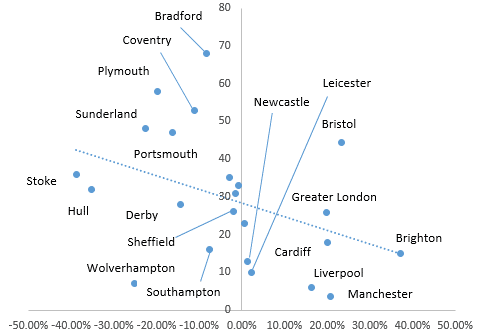Inspiration for this post comes from my friends at the University of Liverpool who should take credit for what appears below. I hope it does justice to their hunch that there may be a relationship between Football League position and the results from the 2016 United Kingdom European Union membership referendum.
What appears below is data for 23 English cities with clubs playing in the Football League this season according to their current league position as of today and the Brexit vote
Where a city has more than one team, the average league position for all teams is reported. For example, in Greater London covers 11 teams (Arsenal, Chelsea, Crystal Palace, Fulham, Tottenham, West Ham, Brentford, QPR, Millwall, AFC Wimbledon and Charlton).
The cities on the left of the diagram below voted to leave the EU, while those on the right voted to remain.
At the other end of the spectrum, Brighton and Hove voted 68.8% (Remain) and 31.4% (Leave), the margin being 37.2%.
As I have plotted the "Remain" option as positive (my implicit pro-EU bias), this means the greater the number of remain votes, the lower the league position. It is no surprise to see the strong remain urban centres of Liverpool, Manchester and Cardiff appear in the bottom right of the graph. Greater London is, on average, under performing but this is obviously an aggregate observation and should be treated as such. Bristol is the biggest under performing pro-EU city, largely because Bristol Rovers compete in the 3rd tier of English Football.
On the other side, pro-leave cities that are arguably doing better than one might expect include Wolverhampton, Southampton, Sheffield and Derby. Sunderland, Portsmouth, Plymouth, Coventry, Bradford and Stoke certainly support the view that leave voter come from places with football clubs that play in the lower tiers of English football.
Of course, there are many reasons why this might be the case. I will explore these at a later date.

 RSS Feed
RSS Feed